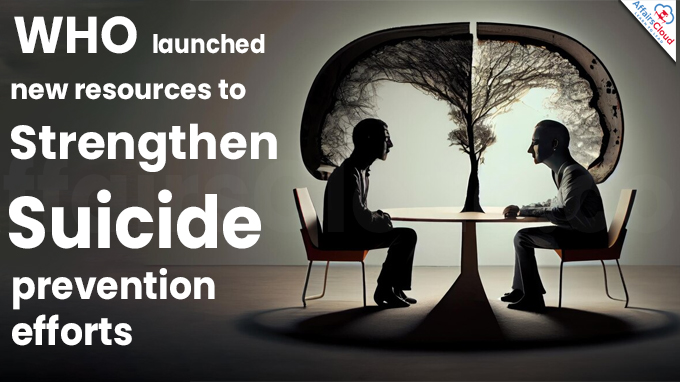
- 4th version of Preventing Suicide: a resource for media professionals (2023 update).
- Policy brief on the health aspects of decriminalization of suicide and suicide attempts.
The resources provide important guidance on two areas that are critical to suicide prevention efforts namely Responsible reporting of suicide by the media and Decriminalization of suicide and suicide attempts.
Key Points:
i.According to WHO, suicide is a significant public health issue and 1 in every 100 deaths globally is by suicide, which affects over 700,000 people every year. It is the 4th leading cause of death in 15-29-year-olds.
ii.Both the United Nations (UN) Sustainable Development Goals (SDGs) and the WHO Global Mental Health Action Plan has set target to reduce the global suicide rate by one-third by 2030.
Responsible reporting of suicide by the media:
i.WHO’s 4th version of Preventing Suicide: a resource for media professionals (2023 update) is produced in collaboration with the International Association for Suicide Prevention (IASP).
- The 3rd version was launched in 2017. The 1st version was released in 2000 and the 2nd version in 2008.
ii.This resource summarises current evidence on the impact of media reporting of suicide and provides practical guidance for media professionals on how to report suicide responsibly.
iii.Responsible media coverage of suicide is an important tool in collective suicide prevention efforts.
- By using this resource, media professionals can help minimize imitative behaviours through accurate, appropriate, and empathetic reporting on suicide, and encourage people to seek vital help
iv.The resource also highlights increasing evidence that media reporting focuses on. Focusing on stories of survival and resilience can inspire others facing similar struggles and can contribute to suicide prevention.
Points from the Resource:
i.Countries have different procedures and legislative frameworks that may influence how deaths are identified, certified, and recorded as suicides, resulting in different quality of the data.
ii.In some countries, national guidelines for the reporting of suicide have been incorporated into codes of practice for media professionals.
iii.The effect of media reports on increasing the number of suicides is referred to as “suicide contagion” and the “Werther effect”
- The ‘Werther effect’ is named after the title character of Johann Wolfgang Goethe’s novel The Sorrows of Young Werther (1774), who dies by suicide. The publication of the novel was followed by several suicides.
Decriminalization of suicide and suicide attempts:
i.As per WHO’s Policy brief resource, The decriminalization of suicide and suicide attempts is a critical step that governments can take in their efforts to prevent suicide.
- It is outlined in WHO’s Comprehensive Mental Health Action Plan 2013–2030, adopted by the 66th World Health Assembly (WHA) in May 2013.
ii.Decriminalization requires the engagement of stakeholders from many different sectors including health, justice, social welfare, education, employment, and agriculture, as well as the media.
- Multiple countries have recently decriminalized suicide and suicide attempts namely Guyana, Pakistan, and Singapore.
Objective:
This policy brief aims to initiate meaningful dialogue around this critical issue and to provide inspiration and guidance to countries in their efforts to decriminalize suicide and suicide attempts.
Criminalization impacts:
i.Criminalization is often justified as a means to discourage people from attempting suicide. It can lead to an increased risk of suicide.
ii.One critical consequence of criminalization is that people do not seek care and support due to the fear of legal consequences.
iii.Criminalization results in suicide being underreported. Suicide and suicide attempts are criminalized in the laws of at least 23 countries worldwide and suicide attempts continue to be actively punished in some of them.
- Countries known to criminalize suicide and suicide attempts among the 23 countries are: Bahamas, Bangladesh, Brunei Darussalam, Gambia, Grenada, Jordan, Kenya, Saudi Arabia, United Arab Emirates (UAE), and so on.
Recent Related News:
According to the WHO report titled Burden of Disease Attributable to Unsafe Drinking Water, Sanitation and Hygiene: 2019 update, among children under the age of 5, unsafe Water, Sanitation and Hygiene (WASH) was responsible for 395 000 deaths and 37 million disability-adjusted life years (DALYs). This represents 7.6% of all deaths and 7.5% of all DALYs in this age group.
About World Health Organisation (WHO)
Director General– Dr Tedros Adhanom Ghebreyesus
Headquarters– Geneva, Switzerland
Established on– 7 April 1948